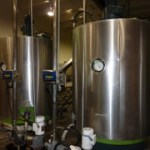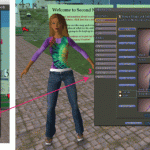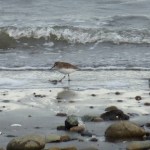
Wired Campus shared an interesting story this morning about a career site for female science / engineering professionals. The site is called ASU CareerWISE and its mission is to help women with problem solving.
I like the idea and I like that they built the site in Drupal, since I've become a big Drupal fan over the past year, but I think they've missed the point in a big way.
You see, every link on the front page leads me to this:
Now, I could be wrong, and I do understand the need for password protection in sensitive matters, but if I were looking for help with problem solving, and I…
My heart sank as I stood on the Metro platform at the Zoo stop and watched the second completely full train pull away. All those stories of people in Japan pushing people into trains started to make sense. It seemed there was no other way to get on the train and getting the rally looked impossible.
I didn't know what to do so I got on a different train and rode in the opposite direction. Two stops later, the crowd didn't quite as bad and now, I didn't have any other way to get back to the hotel anyway. I moved with the crowd, slipped into the still-packed train and tried not to take up…
Funding raising drives come and go but the need to educate the coming generations in science and math never goes away.
With your help, teachers can help their students.
DonorsChoose.org is an online charity that connects individuals, like you, to classrooms in need. The average public school teacher spends $500 - $700 on classroom supplies out of his/her own pocket, and students still go without critical supplies they need to learn. At DonorsChoose, teachers post requests for classroom equipment and supplies, like microscopes, DNA kits, even field trips to the zoo, and you can help fund…
We often hear talk these days about failure in leadership and gutless congress people. I understand wanting to keep out of the fray. Last year, I wrote about a reasonable proposal to help young people and unwittingly tapped into a strain of people out there with an amazing amount of hatred towards kids.
That experience really made me appreciate the courage displayed by Senators Richard Durbin, Patrick Leahy, and Richard Lugar in not giving up on the Dream Act and working once again to try to see it get through congress.
I never knew anything about these kids until a friend in Oklahoma…
Jonathan Eisen (@phylogenomics) shared this wonderful Lady Gaga lab spoof on Twitter the other day. It rocks.
And, it makes me wonder if my pals who've been thinking about getting students interested in careers by having scientists talk on camera might be going at this the wrong way. Sure, videos of scientists talking are totally fascinating (yawn..) and...
Oh right, where was I?
Well, here's the thing. If you want to get kids interested in something, you have to use something that interests them. Your strategy isn't going to work unless the kids find it intriguing enough to go watch…
Theo chocolate is situated in a neighborhood called Fremont, in the city of Seattle, in the former Redhook brewery. I used to consult for Redhook in my microbiology days, when I had access to a -80°C freezer and a proper microscope, so the building has a comfortable feel and some pleasant memories.
These days the bar is gone and the aromas are more like roasting coffee than brewing beer. Most of machinery, though, is surprisingly similar. The equipment is very much the same as the equipment you'd find in many kinds of biotech manufacturing facilities. There are giant scales, fermenters,…
It's been exciting to see the progress in getting the Theobroma cacao genome sequenced and off to the databases.
But....
I've toured the Theo chocolate factory twice now, and there's a crucial piece in the story that appears to be missing.
photo by S. Porter 2010
You see, chocolate is like wine. We don't get the chocolate we love from eating the fruit. We get the so-called "food of the gods" by eating the fruit after it's been fermented. And, just like wine, microorganisms are the ones doing the fermenting.
I learned this from attending two separate tours at Theo chocolates, our local…
This summer, Seattle's weather has been cloudy and cold. Luckily, "cloud" has another meaning.
For those of you wondering, what "cloudy" means, Eric Nilsson, from Insilicos, has a great article in Xconomy on Seattle and cloud computing.
A quick description of cloud computing would is to think of computer hardware, that is, the servers and data centers, as "utilities." Where other utilities like the Rocky Reach Dam produce and sell electricity, cloud utilities sell computing power. How they sell it is the distinguishing piece.
I think this quote from the article describes it best:…
If you're a high school or college student with an interest in biomedical sciences, or healthcare careers, the NIH has set up an electronic mentoring program to help you find a guide.
The mentoring happens via email and students must be 16 yrs or older.
The site claims the mentors are carefully screened. I'm not sure what screening means to the NIH. At our local high school, they used to require that mentors get fingerprinted and have a background check. Maybe NIH screening means you have to have gotten a grant funded or be registered in the NIH commons.
Please note: the program is…
One of my hobbies lately has been to get either RNA seq or microarray data from GEO and do quick analyses. Not only is this fun, I can find good examples to use for teaching biology.
One of these fun examples comes from some Arabidopsis data. In this experiment, some poor little seedlings were taken out of their happy semi-liquid culture tubes and allowed to dry out. This simulated drought situation isn't exactly dust bowls and hollow-eyed farmers, but the plants don't know that and most likely respond in a similar way.
We can get a quick idea of how the plants feel about their situation…
Last summer, I had the good fortune to attend a conference in Washington D.C. on Vision and Change in Undergraduate Biology education. There were lots of inspiring speeches, cool videos, and talks about building more student-centered classrooms and strategies for change.
Surprisingly, many of the attendees seemed unaware that there is a group of instructors, and educational programs who embody this vision, albeit with a bit of twist.
These are the biotech instructors and biotech education programs at the community colleges.
Many of the ideas described at the Vision and Change conference…
Every June, an incredible event takes place.
Biotechnology educators gather in Berkeley, California, from across the US, to discuss new trends in biotechnology education, learn from each other and share information about educating students for the biotechnology workforce.
There are tours of local biotech companies like Genentech and local research institutes like the cancer center at UCSF. New kits and techniques can be tried and practiced in hands-on workshops. And instructors get to practice new bioinformatics techniques like analyzing Next Generation DNA sequencing data or working with…
One of the many interesting sessions I attended at ScienceOnline 2010 (#scio10) covered the questions of trust and critical thinking.
Sitting in the audience, I couldn't help but think of a mash-up (like on Glee!) between this session the one on Fact checking.
Granted, I know I'm a nitpicky scientist with an obsession for minutiae but I kept hearing statements during the session that I either wondered about or I knew were completely wrong.
Here's our first mashup tweet from docfreeride from David Dobbs:
Writing 1st book, description of bit character in mid/late 60s... after book came…
Have you ever wanted to volunteer your talents and help with fun projects like these:
* Refurbish computers for schools
* Teach students how to use popular software or online services
* Build a database for a nonprofit
* Help out in your school's computer lab
* Become an online mentor for students across the country
In the spirit of MLK day, Serve.gov is calling on educators and tech people to participate in connecting schools and non-profits with tech needs to those who can help. You can use the widget below to find projects in your area.
To quote Serve.gov, and Dr. King…
ScienceOnline 2010 was one of the most amazing meetings I've attended in a long time and it's going to take some time to process it all, but in the mean time, it seems other bloggers (phylogenomics, CogSci, and Ed) have started one of those meme things and so, here goes.
At ScienceOnline 2010, I learned:
More than I ever wanted to know about the intimate details of duck sex. courtesy of Carl Zimmer!
Likewise for dolphins. courtesy of Kevin Zelnio!
Why the instantiation of Baked Alaska will never be as good as the Platonic Ideal. (courtesy of Dr. Freeride)
What DNA Jesus would…
Okay, I'll grant that visiting Second Life can seem a bit uncomfortable, especially at first, but it does open some new doors and present an alternative to travel.
In flu season, virtual visits could be the next best thing to being there. (Yikes, that sounds like an ad. No more yahoo news for me!)
Here's where you can attend ScienceOnline 2010 in Second Life (http://slurl.com/secondlife/Research%20Triangle%20Park/128/129/25).
The next excuse might be that you don't know how to use Second Life or what to do. Never fear. That's a solvable problem.
I have a primer on attending a…
Is there a place for citizen scientists in the world of digital biology?
Many of the citizen science projects that I've been reading about have a common structure. There's a University lab at the top, outreach educators in the middle, and a group of citizens out in the field collecting data.
After the data are collected, they end up in a database somewhere and the University researchers analyze them and write papers. At least that's my impression so far.
It seems to me, that with all kinds of databases out there, on-line, there should be plenty of opportunity for both citizens and student…
A common theme I hear in talks on personalized medicine, is that increased access to genomic data and medical literature are changing the relationship between doctors and patients. Patients are through being passive recipients of paternalistic health care. They are demanding to participate and be treated as partners with health care providers.
Citizen science can serve a similar role.
Just as personalized medicine is starting to make it possible for individuals to monitor and participate in their own personal health, citizen science is making it possible for people to participate and…
When I was a post-doc, I spent a few months seriously thinking about changing careers and teaching high school. I might have followed through on that plan, too, but I didn't know how to pay for it.
Today, if you have a background in science, technology, math, or engineering, you can retrain to become a teacher and the National Science Foundation will help. The Robert Noyce scholarship program has funds to help ease that transition to the classroom.
From the NSF web site:
The Robert Noyce Teacher Scholarship Program seeks to encourage talented science, technology, engineering, and…
Do citizen science efforts ever go beyond "feel good" contributions? Do the data get published in peer-reviewed journals?
In an earlier post, I started a list of citizen science projects that allow students to make a contribution. Many commentors are graciously adding to that list and I thank you all! I'm glad to learn there are so many interesting projects and ways for people to get involved. Science is so empowering!
My question today concerns things like outcomes and deliverables. We'd like to assume that good things are coming from citizen science because people are involved, but I…









